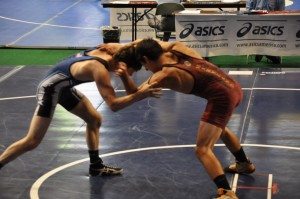
Wrestlers know this…do we?
He attributed his survival to his sport.
On August 31, 2004 during a night patrol in Baghdad, a rocket-propelled grenade hit a disabled supply truck that U.S. Army Sgt. George T. Manning and two other soldiers were moving to the side of the road. Manning heard a thundering boom, and then felt a massive blast as he was thrown from the truck to the road where he landed, on fire and on his back.
“I opened my eyes and wasn’t sure what had happened,” Manning said. “But one thing I knew for sure–I did not belong on my back.”
You could hear his audience’s collective wince of understanding and support.
I doubt very few of us had military experience or had been near an exploding grenade. But everyone who sat in that audience knew well the importance of staying off your back.
We had gathered in Annapolis for the Maryland Chapter of the National Wrestling Hall of Fame’s induction ceremony to honor local inductees to the national organization.
The last place a wrestler wants to be is on his back.
Manning, a Purple Heart Recipient who wrestled for Kent County High School as a teen and is now with the Fort Meade Police department, was recognized for his courage and perseverance in the face of adversity. He survived the blast, rolling off of his back to extinguish the flames that left him with second and third degree burns on 40 percent of his body.
In his remarks at the October ceremony, he attributed his quick response to his training and wrestling experience, where pinning your opponent, both shoulders to the mat, is the ultimate goal of every match.
Wrestlers belong on their feet, not on their backs.
“It’s the oldest form of recreational combat,” one of the guest speakers told us. It’s a sport where you train far more than you compete, often year round.
Equalized by weight classes, wrestlers score with takedowns where they use techniques and moves to gain or regain control of an opponent. They win by scoring the most points or by pinning their opponent, back flat to the mat.
They train to always be in position to score, to dominate, to win–and to adjust to whatever move or counter move their opponent throws at them.
As Manning talked about his battle to get back on his feet, I marveled at his clarity. He knew where he belonged.
His message went beyond the battlefield.
And I wondered. What of our training and our experience has shaped where we belong? Where are we comfortable? Where are we not?
As the holiday season approaches, I’ve thought often of the sergeant’s remarks. In many ways, we are ushering in the season of belonging.
Some of us will carry on as we have in years past and enjoy deeply rooted traditions, our roles and place intact.
Yet others of us will struggle with changes that make the past impossible to recreate. Our circumstances have changed and we have no choice but to find a way to adjust.
Like wrestlers, our training regimen may have prepared us for one thing, but we experience another. With effort, we can adapt and respond and move through the challenge, reconfiguring our lives as we go. We hope our training and experience will clearly guide us.
May your holidays be filled with joy, happiness, and a clear but adaptable sense of belonging.
This column was originally published as part of my “From Where I Sit” series at in Towson Times.
Follow Me!